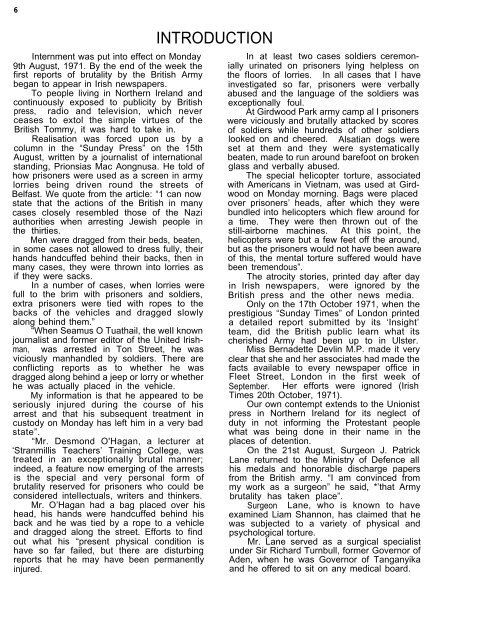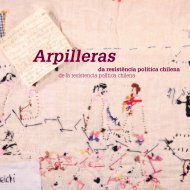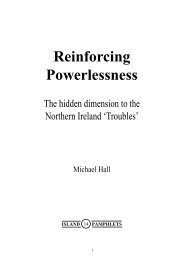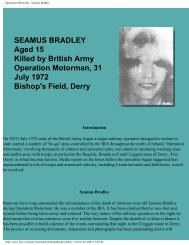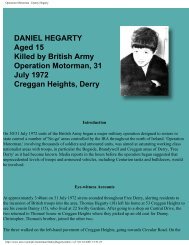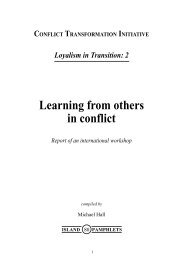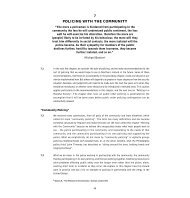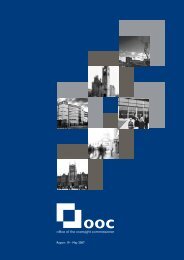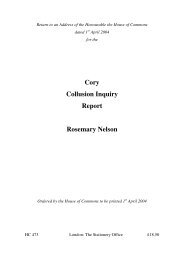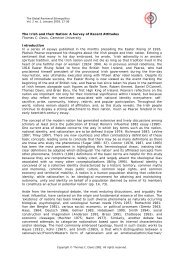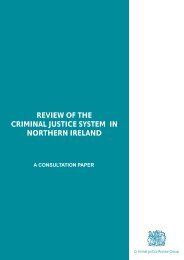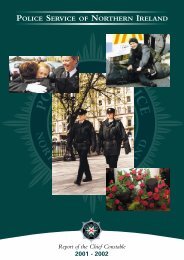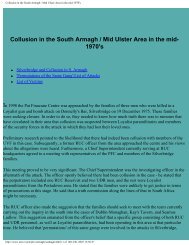Create successful ePaper yourself
Turn your PDF publications into a flip-book with our unique Google optimized e-Paper software.
6<br />
Internment was put into effect on Monday<br />
9th August, 1971. By <strong>the</strong> end of <strong>the</strong> week <strong>the</strong><br />
first reports of brutality by <strong>the</strong> British Army<br />
began to appear in Irish newspapers.<br />
To people living in Nor<strong>the</strong>rn Ireland and<br />
continuously exposed to publicity by British<br />
press, radio and television, which never<br />
ceases to extol <strong>the</strong> simple virtues of <strong>the</strong><br />
British Tommy, it was hard to take in.<br />
Realisation was forced upon us by a<br />
column in <strong>the</strong> “Sunday Press” on <strong>the</strong> 15th<br />
August, written by a journalist of international<br />
standing, Prionsias Mac Aongnusa. He told of<br />
how prisoners were used as a screen in army<br />
lorries being driven round <strong>the</strong> streets of<br />
Belfast. We quote from <strong>the</strong> article: “1 can now<br />
state that <strong>the</strong> actions of <strong>the</strong> British in many<br />
cases cIosely resembled those of <strong>the</strong> Nazi<br />
authorities when arresting Jewish people in<br />
<strong>the</strong> thirties.<br />
Men were dragged from <strong>the</strong>ir beds, beaten,<br />
in some cases not allowed to dress fully, <strong>the</strong>ir<br />
hands handcuffed behind <strong>the</strong>ir backs, <strong>the</strong>n in<br />
many cases, <strong>the</strong>y were thrown into lorries as<br />
if <strong>the</strong>y were sacks.<br />
In a number of cases, when lorries were<br />
full to <strong>the</strong> brim with prisoners and soldiers,<br />
extra prisoners were tied with ropes to <strong>the</strong><br />
backs of <strong>the</strong> vehicles and dragged slowly<br />
along behind <strong>the</strong>m.”<br />
“When Seamus O Tuathail, <strong>the</strong> welI known<br />
journalist and former editor of <strong>the</strong> United lrishman,<br />
was arrested in Ton Street, he was<br />
viciously manhandled by soldiers. There are<br />
confIicting reports as to whe<strong>the</strong>r he was<br />
dragged along behind a jeep or lorry or whe<strong>the</strong>r<br />
he was actually placed in <strong>the</strong> vehicle.<br />
My information is that he appeared to be<br />
seriously injured during <strong>the</strong> course of his<br />
arrest and that his subsequent treatment in<br />
custody on Monday has left him in a very bad<br />
state”.<br />
“Mr. Desmond O'Hagan, a lecturer at<br />
‘Stranmillis Teachers’ Training ColIege, was<br />
treated in an exceptionalIy brutal manner;<br />
indeed, a feature now emerging of <strong>the</strong> arrests<br />
is <strong>the</strong> special and very personal form of<br />
brutality reserved for prisoners who could be<br />
considered intelIectuals, writers and thinkers.<br />
Mr. O’Hagan had a bag placed over his<br />
head, his hands were handcuffed behind his<br />
back and he was tied by a rope to a vehicle<br />
and dragged along <strong>the</strong> street. Efforts to find<br />
out what his “present physical condition is<br />
have so far failed, but <strong>the</strong>re are disturbing<br />
reports that he may have been permanently<br />
injured.<br />
INTRODUCTION<br />
In at least two cases soldiers ceremonially<br />
urinated on prisoners lying helpless on<br />
<strong>the</strong> fIoors of lorries. In all cases that I have<br />
investigated so far, prisoners were verbalIy<br />
abused and <strong>the</strong> language of <strong>the</strong> soldiers was<br />
exceptionally foul.<br />
At Girdwood Park army camp al I prisoners<br />
were viciously and brutalIy attacked by scores<br />
of soldiers while hundreds of o<strong>the</strong>r soldiers<br />
looked on and cheered. Alsatian dogs were<br />
set at <strong>the</strong>m and <strong>the</strong>y were systematicalIy<br />
beaten, made to run around barefoot on broken<br />
glass and verbalIy abused.<br />
The special heIicopter torture, associated<br />
with Americans in Vietnam, was used at Girdwood<br />
on Monday morning. Bags were placed<br />
over prisoners’ heads, after which <strong>the</strong>y were<br />
bundled into helicopters which fIew around for<br />
a time. They were <strong>the</strong>n thrown out of <strong>the</strong><br />
stiIl-airborne machines. At this point, <strong>the</strong><br />
helicopters were but a few feet off <strong>the</strong> around,<br />
but as <strong>the</strong> prisoners would not have been aware<br />
of this, <strong>the</strong> mental torture suffered would have<br />
been tremendous”.<br />
The atrocity stories, printed day after day<br />
in Irish newspapers, were ignored by <strong>the</strong><br />
British press and <strong>the</strong> o<strong>the</strong>r news media.<br />
Only on <strong>the</strong> 17th October 1971, when <strong>the</strong><br />
prestigious “Sunday Times” of London printed<br />
a detailed report submitted by its ‘Insight’<br />
team, did <strong>the</strong> British public learn what its<br />
cherished Army had been up to in Ulster.<br />
Miss Bernadette Devlin M.P. made it very<br />
clear that she and her associates had made <strong>the</strong><br />
facts availabIe to every newspaper office in<br />
Fleet Street, London in <strong>the</strong> first week of<br />
September. Her efforts were ignored (Irish<br />
Times 20th October, 1971).<br />
Our own contempt extends to <strong>the</strong> Unionist<br />
press in Nor<strong>the</strong>rn Ireland for its neglect of<br />
duty in not informing <strong>the</strong> Protestant people<br />
what was being done in <strong>the</strong>ir name in <strong>the</strong><br />
places of detention.<br />
On <strong>the</strong> 21st August, Surgeon J. Patrick<br />
Lane returned to <strong>the</strong> Ministry of Defence all<br />
his medals and honorabIe discharge papers<br />
from <strong>the</strong> British army. “I am convinced from<br />
my work as a surgeon” he said, *’that Army<br />
brutality has taken place”.<br />
Surgeon Lane, who is known to have<br />
examined Liam Shannon, has claimed that he<br />
was subjected to a variety of physical and<br />
psychological torture.<br />
Mr. Lane served as a surgical specialist<br />
under Sir Richard Turnbull, former Governor of<br />
Aden, when he was Governor of Tanganyika<br />
and he offered to sit on any medical board.


